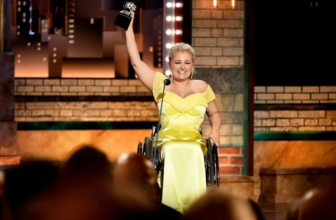This holiday season, if you have a family member or friend who is d/Deaf or hard of hearing, these tips will help you support them at family gatherings and make them feel included.
Supporting d/Deaf and Hard of Hearing Family and Friends at Holiday Gatherings
“Circle the Thanksgiving table, and mute political debates!”
“Rock around the Christmas tree and silence sibling standoffs!”
If a product capable of muting the holidays truly existed, it would fly off the shelves. One of the largest complaints by most is that going home is loud and heated. Who wouldn’t want to silence the noise and simply enjoy their surroundings?
While true silence is not the reality for the majority of d/Deaf and hard-of-hearing individuals, the experience of diminished hearing during the holidays is idolized by many hearing people.
Becoming Deaf this past year, I was not prepared for the degree to which my hearing status would be labeled desirable during the holidays. “I wish I couldn’t hear my family when they *insert obnoxious holiday activity*” is commonly thrown at me, with people I barely know wishing they too could be d/Deaf at the holidays.
I’m sure I was guilty of making these same statements before losing my own hearing, wishing I could tune out extended family humming “Jingle Bells” incessantly or that I could mute members’ yelling about “that crook Hillary.” The reality of the silence, though, is anything but desirable.
I want to clarify before sharing more of my story and tips and tricks that I am not lamenting my d/Deafness. I have fully embraced my Deaf identity, adopting ASL as my preferred language and existing predominantly in Deaf spaces. My Deafness is nothing to lament. However, the lack of accommodations by everyone around me is.
Sitting around the Thanksgiving table this last November, I found my hearing aids unable to keep up, producing feedback as 14 unique voices fought to be in focus. Instead of following only 1-2 people, as one may expect, I followed no one, finding myself consumed by a headache instead.
After dinner, the TV came on, notably lacking captions. As I scrolled through my phone, watching ASL videos and engaging with my Deaf community from afar, I knew I certainly ran the risk of being labeled rude and unengaged. Asking around if the captions could be turned on, a common issue emerged: No one knew how. While both these issues are not caused by the people around me in the least — if anything, they are incredibly accommodating in the ways they can be — both these Deaf “fails” illustrate the limitations of technology. If hearing family and friends truly want to do better, here are some paths forward:
1. Set up the architecture of the holiday event to be Deaf friendly.
While not all Deaf people lip-read, arranging furniture to allow all attendees to see each other’s faces is highly beneficial. For those who lip-read like me, this allows me to see speakers’ mouths and interpret the noise my hearing aids cannot keep up with. This also, at a basic level, allows me to identify who is speaking, and to see their facial expression, giving some indication of the tone of the conversation, whether lip reading or not. This is best accomplished using the following steps:
- Avoid large centerpieces that block people from seeing one another across the table.
- Allow Deaf attendees to select their chair first, according to where they can best lip read.
- Move chairs to be in a circle or semi-circle, rather than a straight line in the living room.
2. Take steps to ensure communication is as clear as possible for the Deaf attendee.
This means moving to be in front of us to address us or ask a question, rather than trying to speak in one of our ears or with your back turned to us. This also can mean enunciating, avoiding addressing us with food in your mouth, and not yelling from across the room. Often raising your voice actually does nothing. It’s the frequency and clarity of words that make them difficult to follow, not the volume. Follow our lead, but always address us in front of us, facing us, and enunciate for those of us who lip-read.
3. Test out alternative ways to get our attention, or better yet, ask what we prefer.
Hearing friends and family tell me all the time they think it’s rude to wave in front of my face to get my attention. However, this is one of the most effective ways to grab my attention when my hearing aids either are not in or cannot focus. Tapping on a table, stomping on a floor, or using another form of vibration is also highly effective. It can be jarring to have someone touch me from behind when I cannot hear them, so while it may seem ruder than simply touching my back or raising your voice, waiving or stomping truly are preferable. These preferences, of course, vary by person, so asking can go a long way also! And if you think we’re simply ignoring you, remember we probably aren’t. You likely just don’t have our attention.
4. Automatically enable captioning on all devices.
As I already said, closed captioning can often fail when it’s too complicated to turn on, or heaven forbid, it’s not available. This still happens on the occasional streaming movie, despite recent lawsuits. However, turning captions on before we even arrive can go a long way. This eliminates the anxiety of asking for them to be turned on and also prevents the inevitable hunt for the singular family member who knows how to work the TV.
5. Allow phones at the table during the holiday meal.
On the point about captioning, allowing phones at the table can also go a long way. Many Deaf individuals use live captioning software such as Otter to follow in-person conversations. By banning devices, it can often feel taboo to use our phones for this purpose, even if the intention is not to be rude or distracted. Universally allowing for phones destigmatizes this potential use and allows us to not be singled out.
6. Include us in every conversation at holiday gatherings.
One of the most annoying parts of being Deaf is being told “I’ll tell you later” or “It didn’t matter”. If everyone else around the table understood what was said, there’s a good chance that statement may come up again later, even if it seems unimportant to you. We don’t want to be filled in when you have a spare moment, we want to be included.
7. Respect preferred language and make an effort to learn some ASL phrases.
Most Deaf people do not expect their family and friends to drop everything and become fluent in ASL by the holidays. However, over time, we do appreciate progress, and often expect it of close family and friends. I cannot as a Deaf person simply learn how to follow a conversation, but everyone around me can learn a language, a tool, that enables me to follow more. It doesn’t take a lot of time, or any money to learn a few simple signs to start, whether “Happy Holidays” or something more practical such as “eat,” “bathroom,” and “ready” This small amount of effort truly goes a long way.
Being Deaf does, of course, have its advantages. As I said, having an off button for family arguments may be considered a relief and desirable ability to many hearing people. And I’m not ashamed of my Deafness, I’m proud to use ASL and be part of this community. I’m also more than happy to share what accommodations are helpful to me or even teach a few signs. However, to place all the responsibility on us to ensure our ability to communicate is not fair. These 7 steps are quite simple; it’s time for hearing family and friends to step up.
How can hearing family and friends support you as a d/Deaf or hard of hearing person during the holidays?
Share your experiences with our community in the comments.
Photo by Nicole Michalou on Pexels








